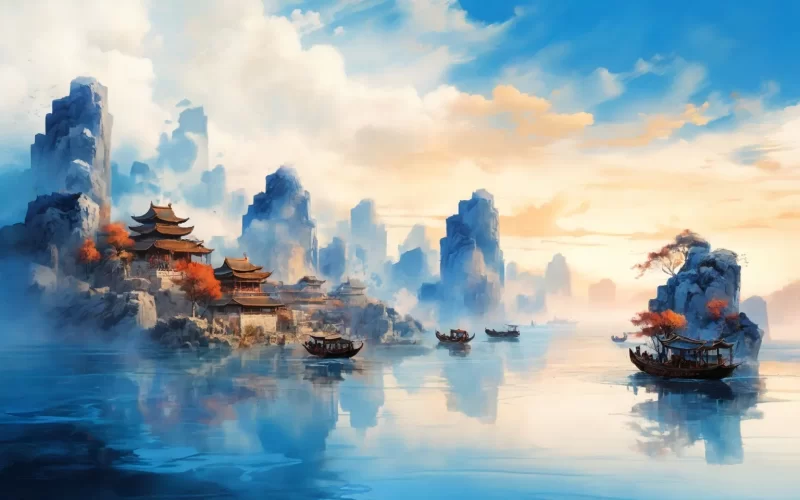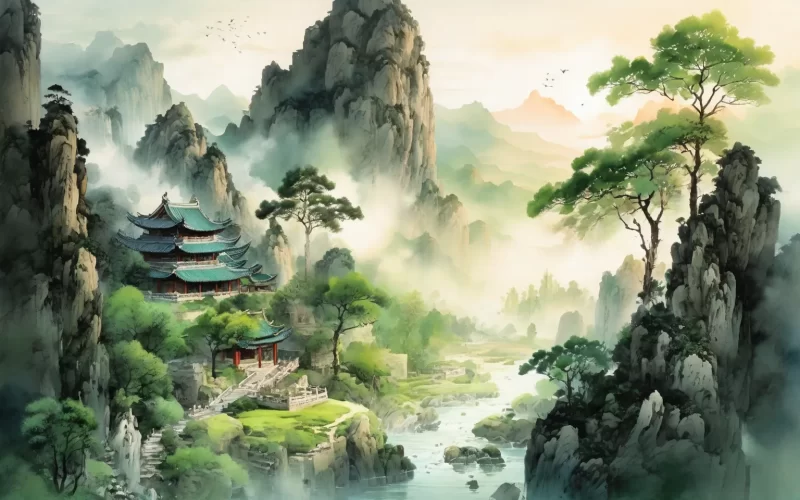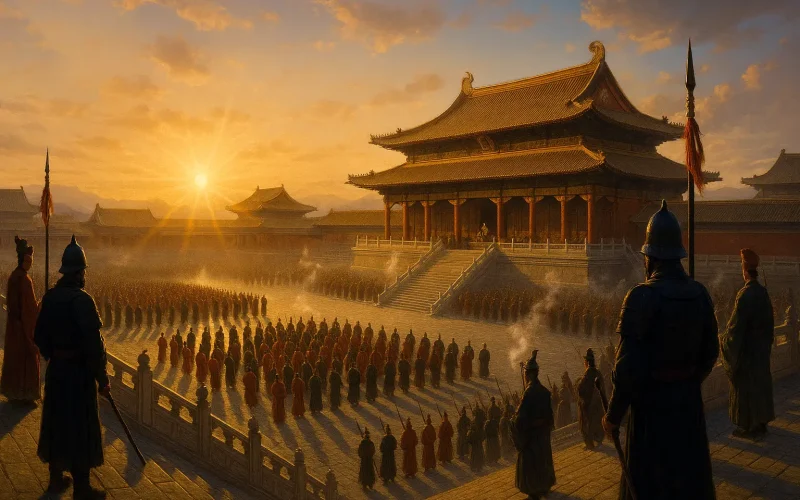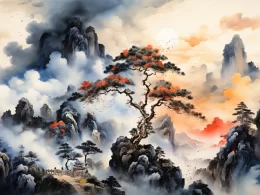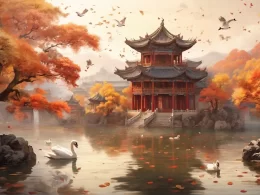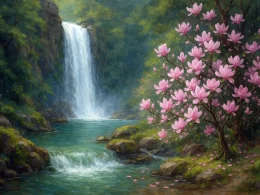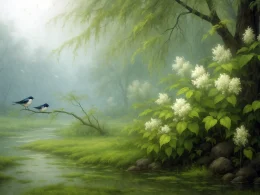As the years go by, give me but peace,
Freedom from ten thousand matters.
I ask myself and always answer:
What can be better than coming home?
A wind from the pine-trees blows my sash,
And my lute is bright with the mountain moon.
You ask me about good and evil fortune?....
Hark, on the lake there's a fisherman singing!
Original Poem
「汉江临眺」
王维
楚塞三湘接, 荆门九派通。
江流天地外, 山色有无中。
郡邑浮前浦, 波澜动远空。
襄阳好风日, 留醉与山翁。
Interpretation
Composed in 740 AD when Wang Wei passed through Xiangyang on official duties, this poem captures the magnificent riverscape viewed from a high vantage point. Then at the prime of his forties, the poet's mind was both lucid and expansive. The verses depict the grandeur witnessed from the Han River banks and the profound inspiration it stirred within him.
First Couplet: "楚塞三湘接,荆门九派通。"
Chǔ sài sān xiāng jiē, jīng mén jiǔ pài tōng.
"Chu's frontier links Three Xiang's flow; / At Jingmen nine tributaries go."
These lines outline the Han River's mighty course without naming it directly, showcasing its north-south and east-west grandeur. With economical brushstrokes, Wang creates a "thousand-mile landscape on a single scroll," establishing an expansive vista.
Second Couplet: "江流天地外,山色有无中。"
Jiāng liú tiān dì wài, shān sè yǒu wú zhōng.
"The river streams beyond heaven's rim; / Mountain hues hover, now bright, now dim."
Transitioning from macro to micro, the couplet contrasts the river's boundlessness with the mountains' ethereal beauty. "Mountain hues hover" particularly captures distant peaks' elusive charm, resonating with Zhuangzi's philosophy of Being and Non-being.
Third Couplet: "郡邑浮前浦,波澜动远空。"
Jùn yì fú qián pǔ, bō lán dòng yuǎn kōng.
"Xiangyang floats upon the shore; / Waves make distant heavens roar."
Shifting to foreground details, the verbs "float" and "roar" animate the scene—the city seemingly buoyant on water, the sky vibrating with river energy—creating immersive dynamism.
Fourth Couplet: "襄阳好风日,留醉与山翁。"
Xiāngyáng hǎo fēng rì, liú zuì yǔ shān wēng.
"Xiangyang's fine breeze and light, / I'll stay drunk with mountain sage tonight."
The concluding couplet localizes the experience, referencing Xiangyang's legendary hermit to ground cosmic vistas in human warmth and conviviality.
Holistic Appreciation
"Viewing the Han River" progresses methodically from geographical grandeur to intimate appreciation. The poem moves through layered perspectives—distant mountain-river configurations, mid-range optical illusions, and finally human-scale enjoyment—forming a panoramic scroll that blends movement and stillness. Wang Wei's signature "painting within poetry" shines through, particularly in the celebrated couplet about the river transcending heaven and mountains existing between Being and Non-being—a masterpiece of suggestive economy.
Artistic Merits
This poem embodies a refreshingly elegant tone and majestic compositional grandeur. Its most distinctive feature lies in the masterful integration of multiple dimensions—the abstract and concrete, movement and stillness, near and far—through a writing technique that harmonizes subjective perception with objective scenery, thereby imbuing landscapes with spiritual vitality. Words like "float," "quiver," and "hover between being and non-being" not only depict scenes but enhance poetic resonance, endowing natural vistas with dynamic vitality. Furthermore, the perfect fusion of emotion and scenery throughout the poem, along with its transcendent artistic conception, reflects Wang Wei's consistent embodiment of ideal personality and aesthetic pursuit.
Insights
The poem models how to engage with nature's immensity while maintaining spiritual poise. It suggests that true vision encompasses both the river flowing beyond heaven's edge and the pleasure of local wine-sharing—reminding us that cosmic perspective and human connection need not exclude each other, but can coexist in enlightened awareness.
Poem translator
Kiang Kanghu
About the poet

Wang Wei (王维), 701 - 761 A.D., was a native of Yuncheng, Shanxi Province. Wang Wei was a poet of landscape and idylls. His poems of landscape and idylls, with far-reaching images and mysterious meanings, were widely loved by readers in later generations, but Wang Wei never really became a man of landscape and idylls.






